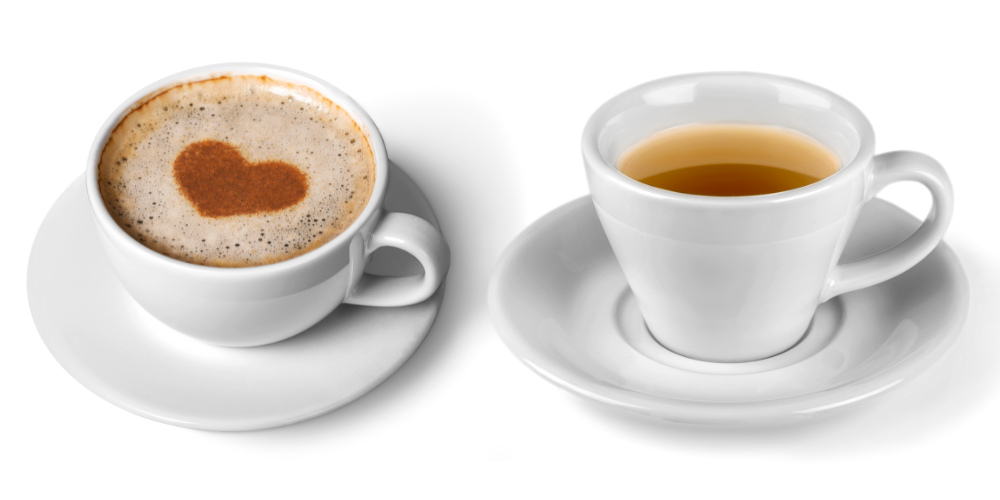Tea vs. Coffee: The Ultimate Caffeine Showdown!

For many of us, the day doesn’t truly begin until that first glorious sip of caffeine hits the bloodstream. Some folks swear by the bold, eye-opening jolt of coffee, while others prefer the soothing embrace of a perfectly brewed cup of tea. But when it comes to health, which one comes out on top?
Both tea and coffee have been praised (and criticized) for their effects on the body, from boosting energy to providing powerful antioxidants. But it isn’t all positive. Let’s break it down—caffeine levels, health benefits, and all—so you can decide which brew deserves your loyalty.
Why Tea Might Be Your Cup of Choice
Tea has been around for thousands of years, with origins tracing back to ancient China. Legend has it that Emperor Shen Nong accidentally discovered tea around 2737 BC when leaves blew into a pot of boiling water.
Health Benefits of Tea
- Rich in Antioxidants – Tea is packed with polyphenols that help fight inflammation and protect against cell damage.
- Supports Heart Health – May lower the risk of heart disease by reducing cholesterol and blood pressure.
- Boosts Metabolism – Green tea, in particular, has been linked to increased fat oxidation.
- May Reduce Disease Risk – Tea consumption has been associated with a lower risk of stroke and type 2 diabetes.
- Promotes Relaxation – Thanks to L-theanine, tea offers a calming effect that balances out caffeine.
Downsides of Tea
- Lower Caffeine Content – If you need a serious wake-up call, tea might not cut it.
- Tannins Can Interfere with Nutrient Absorption – These compounds may reduce iron absorption from plant-based foods.
- Hidden Additives – Flavored and bottled teas often contain sugars and artificial ingredients.
Coffee: More Than Just a Morning Pick-Me-Up
Coffee has a slightly more recent history, with its origins rooted in Ethiopia. Legend says a goat herder named Kaldi noticed his goats became extra energetic after eating coffee cherries. Fast forward a few centuries, and coffee is now a global obsession.
Why Coffee is Good for You
- Loaded with Antioxidants – Contains chlorogenic acid, which helps reduce inflammation.
- Increases Alertness and Focus – A strong caffeine kick makes it great for concentration.
- May Lower Disease Risk – Studies suggest coffee drinkers may have a lower risk of Parkinson’s, Alzheimer’s, and type 2 diabetes.
- Supports Liver Health – Moderate coffee consumption has been linked to a lower risk of liver disease.
- May Contribute to Longevity – Research indicates coffee drinkers may live longer.
Downsides of Coffee
- Jitters and Anxiety – High caffeine levels can cause restlessness and increased heart rate.
- May Upset the Stomach – Coffee’s acidity can lead to acid reflux or indigestion.
- Can Be Addictive – Regular drinkers can develop a caffeine dependence.
How Much Caffeine Are You Really Getting?
One of the biggest differences between tea and coffee? Caffeine. That magical, mood-boosting stimulant that keeps the world running. But just how much are you consuming?
Caffeine in Coffee
- Brewed coffee (8 oz): 95-120 mg
- Espresso (1 oz): 63 mg
Caffeine in Tea
- Black tea (8 oz): 40-70 mg
- Green tea (8 oz): 20-45 mg
- White tea (8 oz): 15-30 mg
- Herbal tea: 0 mg (caffeine-free!)
While coffee delivers a quick energy jolt, tea provides a smoother, more sustained lift thanks to L-theanine’s calming effect. If you’re caffeine-sensitive, decaf options exist for both.
A Few More Things to Consider Before Your Next Cup
Both coffee and tea come with perks, but here are a few extra things to keep in mind:
- Staining Effects – Both drinks can stain teeth over time, but coffee tends to be worse.
- Digestive Issues – Coffee is acidic, while some teas (like peppermint and ginger) actually aid digestion.
- Hydration Factor – Both hydrate, but excess caffeine can have a mild diuretic effect.
- Watch the Additives – Loading up on sugar and cream can cancel out health benefits.
Which Should You Choose?
So, which is better? It depends on you.
☕ If you need a strong energy boost, coffee has the higher caffeine content. 🍵 If you want a gentler lift, tea—especially green or black—is a great choice. 💪 If you’re after antioxidants, tea wins (especially green and white varieties). 🔥 If you have a sensitive stomach, tea is typically easier to digest.
At the end of the day, both tea and coffee can be part of a healthy lifestyle. The key? Moderation. Too much caffeine from either source can lead to unwanted side effects.
Finding Your Perfect Cup
There’s no definitive winner in the tea vs. coffee debate. It all comes down to personal preference and how your body responds. Whether you love the bold richness of coffee or the calming ritual of tea, the best choice is the one that makes you feel good.
So, what’s in your cup today?
Beat FOMO by being in the know!
Sign up for our newsletter today and never miss a beat.







